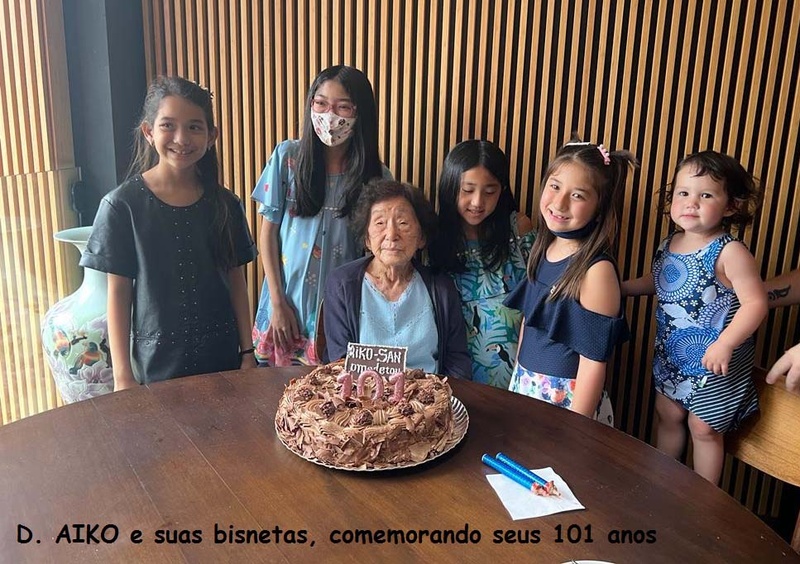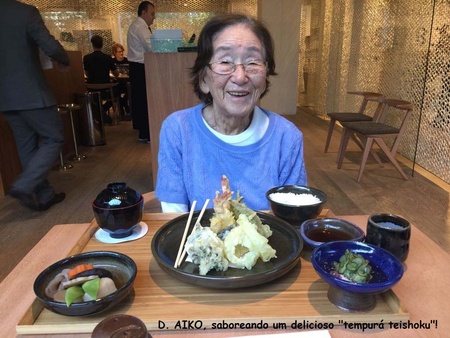Stimulated by the instigating theme proposed by the editors of this newspaper – Nikkei Food x Japanese Food – the memory of Naomi Kawase's beautiful film Taste of Life came to mind. Full of beauty and subtlety, it is one of those films to savor with the eyes and provoke our minds to the small and beautiful things in life. The plot is set against the backdrop of the secret recipe for a traditional treat, dorayaki , much loved by the Japanese. With due permission from the director, I thought of Sabor de Mãe to open my text, for the following reasons:
It can be said that one of the most valuable and enjoyable traditions that we have preserved to this day in our family is being able to gather our sons, daughters-in-law, grandchildren and great-granddaughters at the house of mom or grandma Aiko, as she is affectionately known. In other words, the entire family, which only fails to reach 100% due to the absence of granddaughters Clarissa and Jennifer who live abroad. These meetings are generally held on festive dates, Mother's Day, Father's Day, Christmas, birthdays or at any time, without a formal justification, when the longing for grandma hits everyone's heart. Or vice versa, when grandma is the one who complains about the absence of family members – usually the great-granddaughters are the ones most remembered (lol).
Besides the feeling of longing we feel for grandma, were there other reasons? For being the matriarch of the family? Or would it be the sweetness, affection and respect that your figure shows?
I believe that all the reasons given would have their weight! But we cannot fail to recognize that the sin of gluttony speaks loudly as justification, given the image of the abundant table, with delicious food awaiting diners on these occasions. There could not be any greater motivation for the massive presence of staff. The custom was so important and delicious that it undoubtedly contributed to the family remaining so close and united to this day. This is the strength of Grandma Aiko's cooking! Everyone, including the younger generations, was influenced and won over by the taste of Grandma Aiko's food.
Each meeting was a true party, in which traditional Japanese dishes and Brazilian-style food coexisted without ceremony. A seemingly strange mixture, where, thanks to Grandma Aiko's skilled hands, every dish had its own flavor and a special something, which made anyone the protagonist.
It's hard not to remember and not miss the cod fritters, the meat or cheese pastry, whose dough had a secret that gave it softness and crunchiness at the same time. Those who tried it wanted more! The unmissable roast ham, pork ribs, breaded shrimp, lasagna, spaghetti bolognese, meat risoles, feijoada, breaded steak, among others. All integrated harmoniously and peacefully with nishime , tsukemono , sushi , sashimi , tempura , yakisoba , gyoza , yakizakana , misoshiru , hijiki gohan , soba , udon, oshiruko, chawan mushi , ohagi . And so many other traditional Japanese dishes that, even with limited ingredients, came out of the cook's skilled hands in just a few minutes, with admirable ease and flavor.
They say mother's food satisfies the stomach and the soul. Food has this power: it helps to create bonds with the group, connect people, reconnect with those we love and miss, bring back memories, smells, flavors...
Today, Grandma Aiko still cooks, but very little. After all, she turned 101 last January. One hundred and one years! Although she is lucid, willing and maintaining the same routine for years, we try to alleviate her household chores, leaving her to take care of only the daily menu and the guidance of the kitchen services, which are under the responsibility of her daughter Edith.
Even so, being a centenarian, affection and generosity are still part of Grandma Aiko's way of being. Like when she welcomed her granddaughter who lives in Switzerland and came to visit her last year. He made a point of preparing everything that his granddaughter liked. She didn't forget the meat lasagna, her favorite dish, made with homemade pasta prepared the day before with care; hijiki rice, roasted pork ribs, breaded shrimp.
This is Grandma Aiko, who continues to close the family gatherings with her delicious percolator coffee, which is unmissable. And, on some occasions, as a grand finale , she offers the tasty and digestive umeshu , the ume liqueur that she orders to be served with a piece of ice, to accentuate the taste. Liqueur, by the way, made by herself, once a year, with the care of an artisan, following an old recipe book published in Japan.
Aiko arrived in Brazil in 1927, when she was just 6 years old, in the company of her parents and brothers. Like every Japanese immigrant at that time, he faced countless adversities and difficulties throughout his life. She had to work in the fields as a girl, take care of her younger brother, and lost her father when she was still young, newly married and with a baby. Still in the interior of SP, she had to help her husband in the shops, bars and ice cream shop, working almost 12 hours a day and without a day off. And when the family had to move to the big city, São Paulo, she was left to take care of the house, including cooking for a squad of 10 to 12 people and, in her free time, she dedicated herself to sewing work to help with the household budget. Nothing got her down and nothing stood in the way of her reaching centenary age with a willingness and lucidity to cause admiration.
She has stated countless times that her greatest pride was having managed to get her five children to graduate from top universities, each paying for their own studies, without any parental help. An example that extended to his grandchildren, all of whom graduated and were professionally successful.
Another great source of pride, according to her, was having managed to preserve family ties and unity, as shown by the lively and frequent lunches, with full attendance. “Mission accomplished, I think I did my part”, she says with a mischievous smile.
A few days ago, after the Covid-19 epidemic subsided, she managed to convince her children to take her on a "sentimental tour", a trip of more than 700 km. through the interior of SP, to visit his closest relatives and, particularly, the grave of his parents in the small city of Bastos, and that of his brothers in Presidente Prudente and Álvares Machado.
On that occasion, she confessed, emotionally, that it might have been her last visit. We would like and have reason to think otherwise.
The flavor of Grandma Aiko's life and food deserve to be preserved. It is the mission for the following generations.
.
© 2022 Katsuo Higuchi







